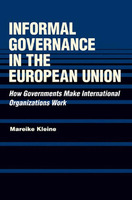Informal Governance in the European Union
How Governments Make International Organizations Work
Author(s)
Kleine, Mareike
Collection
Knowledge Unlatched (KU)Number
101534Language
EnglishAbstract
The European Union is the world’s most advanced international organization, presiding over a level of legal and economic integration unmatched in global politics. To explain this achievement, many observers point to its formal rules that entail strong obligations and delegate substantial power to supranational actors such as the European Commission. This legalistic view, Mareike Kleine contends, is misleading. More often than not, governments and bureaucrats informally depart from the formal rules and thereby contradict their very purpose. Behind the EU’s front of formal rules lies a thick network of informal governance practices.
If not the EU’s rules, what accounts for the high level of economic integration among its members? How does the EU really work? In answering these questions, Kleine proposes a new way of thinking about international organizations.
Keywords
Political Science; Agenda-setting theory; Decision-making; European Parliament; European Union; Member state of the European UnionDOI
10.7591/cornell/9780801452116.001.0001ISBN
9780801469404;9780801469398Publisher
Cornell University PressPublisher website
https://www.cornellpress.cornell.edu/Publication date and place
Ithaca, NY, 2013-09-23Classification
International institutions
EU (European Union)


 Download
Download